 High blood pressure, also called HBP or hypertension, can affect your ability to receive oral healthcare. Performing dental treatments on patients with hypertension can be detrimental! If your blood pressure is too high, many dentists won’t schedule procedures until you receive a health assessment from your medical doctor.
High blood pressure, also called HBP or hypertension, can affect your ability to receive oral healthcare. Performing dental treatments on patients with hypertension can be detrimental! If your blood pressure is too high, many dentists won’t schedule procedures until you receive a health assessment from your medical doctor.
What is high blood pressure?
The two forces measured for your blood pressure reading are the blood pumping out of your heart and into your arteries (systolic), and the heart resting between beats (diastolic). Normal blood pressure readings for a healthy individuals who are 20 years and older should be below 120 for systolic and below 80 for diastolic. If blood pressure readings are consistently higher than 120/80 then you’re probably suffering from hypertension.
According to Heart.org, the website of the American Heart Association, “Untreated high blood pressure damages and scars your arteries.” High blood pressure increases risks of blood clots, organ damage, heart attacks, and strokes. High blood pressure also results increased plaque build-up and weakening blood vessels.
How does high blood pressure affect my dental health?
In a white paper released by the American Diagnostic Corporation, it states: “…elevations of blood pressure can increase a patient’s risk of experiencing a stroke or myocardial infarctions in the dental chair.” Patients with hypertension can also be in danger from local anesthetics that use vasoconstrictors, such as epinephrine, which increase blood pressure and heart arrhythmia.
High blood pressure medications can also affect your dental wellbeing. Some prescriptions cause dry mouth and may also alter your sense of taste. Meds with calcium blockers can also create gum overgrowth, which can affect a patient’s ability to chew and may require periodontal surgery to correct.
Will my dentist still treat me if I have high blood pressure?
Most dentists will not treat patients who have high blood pressure, especially if your numbers are in the Stage 1 or higher range for hypertension. (View the chart at the American Heart Association’s website.) If you’re being treated for high blood pressure, it’s important for you to discuss your condition and your medications with your dentist before beginning any treatments. Most patients being treated for high blood pressure can still have dental procedures, take anti-anxiety medications (often used for oral conscious sedation), and safely receive local anesthetics.
 When you think about oral health, you probably think about your gums and your teeth. After all, Americans spend about $1.8 billion on toothpaste and $775 million on toothbrushes. We’re serious about our oral hygiene habits! (And it appears we put our money where our mouths are, too!)
When you think about oral health, you probably think about your gums and your teeth. After all, Americans spend about $1.8 billion on toothpaste and $775 million on toothbrushes. We’re serious about our oral hygiene habits! (And it appears we put our money where our mouths are, too!) what is plaque? Why is it so bad for your teeth? And how can you get rid of it?
what is plaque? Why is it so bad for your teeth? And how can you get rid of it?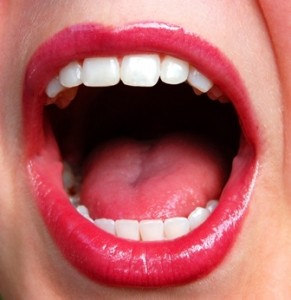 Have you noticed friends or co-workers stand further away than necessary to talk to you? Do you receive daily offers of gum and mints? Does your dog run away when you bend down and say hello? If the answer is yes to any of these questions … you probably have bad breath, also called halitosis.
Have you noticed friends or co-workers stand further away than necessary to talk to you? Do you receive daily offers of gum and mints? Does your dog run away when you bend down and say hello? If the answer is yes to any of these questions … you probably have bad breath, also called halitosis. High blood pressure, also called HBP or hypertension, can affect your ability to receive oral healthcare. Performing dental treatments on patients with hypertension can be detrimental! If your blood pressure is too high, many dentists won’t schedule procedures until you receive a health assessment from your medical doctor.
High blood pressure, also called HBP or hypertension, can affect your ability to receive oral healthcare. Performing dental treatments on patients with hypertension can be detrimental! If your blood pressure is too high, many dentists won’t schedule procedures until you receive a health assessment from your medical doctor.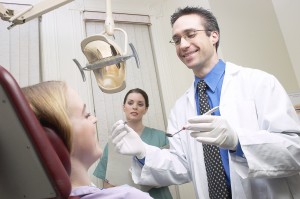 cancer, and testicular cancer put together. But the more you learn about oral cancer and its signs and symptoms, the better able you’ll be to get an early diagnosis and more effective treatment should oral cancer happen to you. Oral cancer responds very well to treatment in the earliest stages.
cancer, and testicular cancer put together. But the more you learn about oral cancer and its signs and symptoms, the better able you’ll be to get an early diagnosis and more effective treatment should oral cancer happen to you. Oral cancer responds very well to treatment in the earliest stages.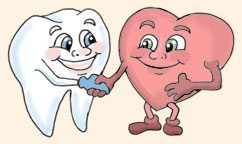 Nearly 80% of American adults suffer from gum disease! Gum disease can devastate your oral health, causing serious dental problems. In fact, the number one reason for adult tooth loss in the United States is untreated gum disease. Worse, though, is the effect that gum disease can have on your heart health.
Nearly 80% of American adults suffer from gum disease! Gum disease can devastate your oral health, causing serious dental problems. In fact, the number one reason for adult tooth loss in the United States is untreated gum disease. Worse, though, is the effect that gum disease can have on your heart health.
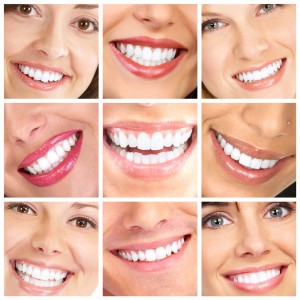 Nineteenth century novelist George Eliot once said, “Wear a smile and have friends; wear a scowl and have wrinkles.”
Nineteenth century novelist George Eliot once said, “Wear a smile and have friends; wear a scowl and have wrinkles.”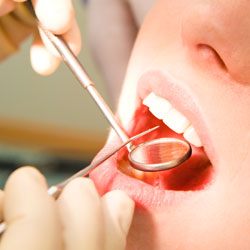 Why are we discussing cancer on a dental newsletter? Because dental health affects your overall health, and your smile is your dentist’s business. Oral Cancer is a little discussed cancer that is on the rise, despite the overall decline in cancer rates. Why? Awareness. Many people simply don’t talk about oral cancer. Your dentist wants to change that.
Why are we discussing cancer on a dental newsletter? Because dental health affects your overall health, and your smile is your dentist’s business. Oral Cancer is a little discussed cancer that is on the rise, despite the overall decline in cancer rates. Why? Awareness. Many people simply don’t talk about oral cancer. Your dentist wants to change that.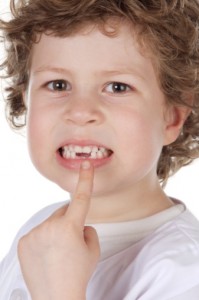 For a kid, losing baby teeth is the ultimate sign of growing up. They compare notes with their friends on how many teeth they’ve lost and who lost them first. And while your little one is just excited to show off the space where a tooth used to be, you may be wondering exactly what to expect about the departure of those deciduous teeth.
For a kid, losing baby teeth is the ultimate sign of growing up. They compare notes with their friends on how many teeth they’ve lost and who lost them first. And while your little one is just excited to show off the space where a tooth used to be, you may be wondering exactly what to expect about the departure of those deciduous teeth.